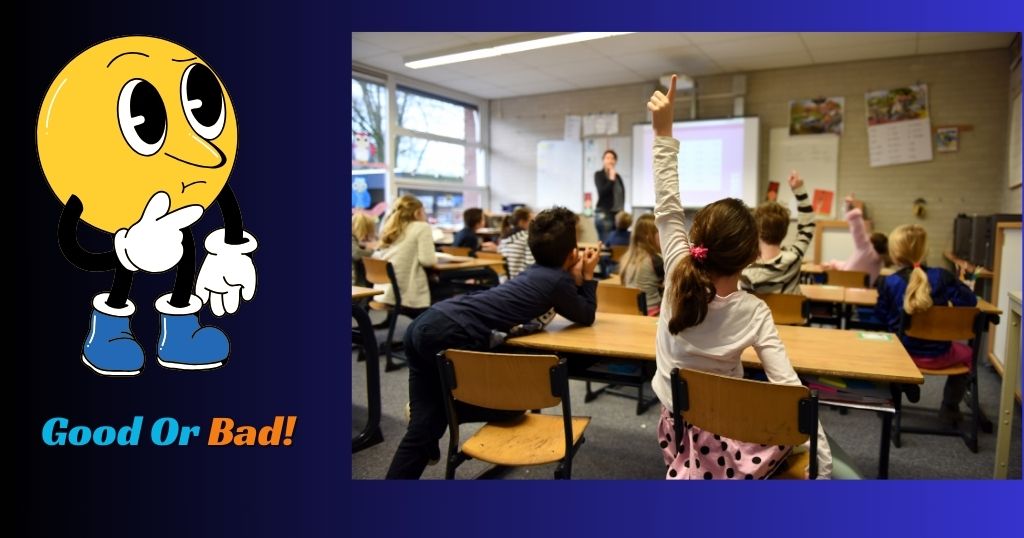
The question of whether school is good or bad has sparked debate for centuries. People have been arguing about schools for a long time. Some people love them, saying they are essential for learning and getting a good job. Others hate them, saying they are too strict and don’t let kids learn what they really need to know. The truth is, like most things in life, schools have both good and bad sides. In this article, we’ll talk about all of these things, and also about some different ways to learn besides going to school. This will help us understand how education might change in the future.
Contents
- 1 Is school Good or Bad?
- 2 Conclusion
- 3 Frequently Asked Questions
- 3.1 1. Are schools good or bad?
- 3.2 2. Is school a waste of time?
- 3.3 3. To what extent are schools ‘bad’ or ‘good’ because of the quality of their students rather than due to the quality of their teachers?
- 3.4 4. Is the school system broken?
- 3.5 5. How can we make schools better?
- 3.6 6. Are there alternatives to traditional schooling?
- 3.7 7. What is the future of education?
- 3.8 8. Is school good for mental health?
- 3.9 9. Does school prepare you for life?
- 3.10 10. What are the pros and cons of homeschooling?
- 3.11 11. What are the pros and cons of online learning?
- 3.12 12. What is unschooling?
- 3.13 13. What are the most important skills for the 21st century?
- 3.14 14. What are some innovative education models?
- 3.15 15. How can parents support their children’s education?
- 3.16 Share this:
Is school Good or Bad?
Whether a school is “good” or “bad” is a nuanced question with no simple answer. It depends heavily on individual perspectives, experiences, and goals. Rather than attempting to categorize schools as simply “good” or “bad,” we should reframe the question. Instead, we should ask: “How can we make a school good?” or “What distinguishes a good school from a bad one?”
Schools are not monolithic entities. Their quality hinges on the individuals who shape their environment: teachers, principals, and staff. Among these, teachers play a pivotal role, directly interacting with students, and fostering a positive or negative school experience.
Drawing from my own education, I can attest to the stark difference between a “good” and a “bad” school environment. Until grade 10, I attended a school where teachers were supportive and passionate about learning. They went beyond the curriculum, sharing stories that inspired and motivated us. They offered guidance on navigating academic challenges, demonstrating a genuine concern for our well-being. They were the embodiment of true educators.
However, my experience shifted dramatically in high school. The teachers were solely focused on academics, neglecting any form of inspiration or guidance. Their sole concern was completing the syllabus and preparing students for exams. This lack of personal connection fostered a sterile learning environment, devoid of the dynamism and support that characterized my previous school. It is in such environments that schools begin to lose their luster.
This highlights the need to move beyond the unhelpful binary of “good” and “bad” schools. Instead, we should focus on identifying the characteristics that distinguish a thriving school from one that falls short. By evaluating schools based on specific criteria, we can navigate the educational landscape and find the right fit for each student’s needs.
Why School Is Important?
Below given are some of the reasons why school is important:
- Education and Knowledge: Schools provide a structured environment for acquiring knowledge and skills essential for navigating the world. This includes literacy, numeracy, critical thinking, problem-solving, and social skills.
- Personal Development: School years are crucial for personal growth and development. Students interact with peers and teachers, fostering social skills, confidence, and self-awareness. Extracurricular activities offer opportunities for exploring interests and discovering talents.
- Future Opportunities: Education unlocks doors to higher education, better career prospects, and financial stability. Schools equip students with the tools and qualifications necessary to succeed in the job market and contribute to society.
- Socialization: School provides a safe haven for children to interact with others their age from diverse backgrounds. This fosters empathy, tolerance, and understanding, preparing them to be responsible citizens in a globalized world.
Many consider that school is bad but you can himself think that if we don’t go to school then for a short time it may feel good. But for a long time, it can be very annoying to be alone. At school, we make friends who support us feel low. Thus school is a very important place where we make friends that last for life.
When School is Considered Bad?
Below given are some of the concerns Regarding School:
- Standardized Curriculum: Critics argue that the rigid and standardized curriculum often fails to cater to individual learning styles and interests, stifling creativity and intellectual curiosity.
- Pressure and Stress: The emphasis on standardized testing and academic performance can create undue pressure and stress on students, leading to anxiety, demotivation, and burnout.
- Limited Focus on Skills: The curriculum may not be adequately preparing students for the 21st-century workforce, neglecting essential skills like critical thinking, problem-solving, collaboration, and communication.
- Socioeconomic Inequality: School systems often perpetuate existing socioeconomic inequalities, with under-resourced schools in disadvantaged areas struggling to provide equal opportunities for their students.
Balanced Approach to answer: Is school good or bad?
Instead of viewing school as inherently good or bad, we need a nuanced understanding. Recognizing its strengths and weaknesses allows for constructive criticism and reform. We need to:
- Emphasize personalized learning: Tailor the curriculum to individual needs and learning styles, fostering creativity and engagement.
- Promote well-being: Prioritize mental health support and stress management strategies, creating a more positive and supportive learning environment.
- Develop essential skills: Include critical thinking, problem-solving, collaboration, and communication in the curriculum to prepare students for the future workforce.
- Address inequalities: Invest in under-resourced schools and provide equal access to quality education for all children, regardless of their background.
Good School Vs Bad School
| Feature | Good School | Bad School |
| Teacher Support | Encouragement, going beyond curriculum, inspiring | Focused on exams and syllabus, neglecting student well-being |
| Motivation | Help overcome challenges, love for learning | Emphasis on rote learning, stifling creativity and individuality |
| Teacher Relationship | Personal connection, trust, and understanding | Disengaged teachers, sterile and uninspiring environment |
| Learning Focus | Understanding, critical thinking, individual growth | Memorization, regurgitation, one-size-fits-all approach |
| Overall Experience | Positive, engaging, and inspiring | Negative, boring, and unfulfilling |
Conclusion
Ultimately, the question of whether school is good or bad isn’t a straightforward one. It depends on the individual student, teachers, management of the school, the quality of the education system, and the implementation of effective reforms.
School is good because it helps you learn things, build skills, make friends, and try new things. But it can also be stressful, boring, and not always give everyone enough attention. By acknowledging both its benefits and drawbacks, we can work towards creating a school system that truly empowers all students to reach their full potential.
Frequently Asked Questions
1. Are schools good or bad?
Schools can be both good and bad. The “good” aspects include providing an education, fostering social skills, and preparing students for future careers. However, schools can also be criticized for being inflexible, failing to cater to individual needs, and creating unnecessary stress and anxiety.
2. Is school a waste of time?
This depends on individual perspectives and experiences. Some argue that school forces students to learn irrelevant information and doesn’t adequately prepare them for real-world challenges. Others believe that the knowledge, skills, and social connections gained in school are invaluable.
3. To what extent are schools ‘bad’ or ‘good’ because of the quality of their students rather than due to the quality of their teachers?
Both factors play a role. Good teachers can inspire and motivate students, while poor teachers can demotivate and hinder learning. However, student behavior, engagement, and prior knowledge also significantly impact the educational environment and learning outcomes.
4. Is the school system broken?
Many argue that the education system requires reform. Criticisms include standardized testing, outdated curriculums, inadequate funding, and lack of individualization. However, there is no single solution, and improvements require addressing various factors simultaneously.
5. How can we make schools better?
There are many proposed solutions, including focusing on personalized learning, fostering creativity and critical thinking, integrating technology effectively, and providing teachers with better training and support.
6. Are there alternatives to traditional schooling?
Yes, various alternative education models exist, including homeschooling, online learning, and unschooling. Each offers different benefits and drawbacks, and the best choice depends on individual needs and preferences.
7. What is the future of education?
The future of education is likely to involve more personalized learning, greater use of technology, and a focus on developing skills needed for the 21st-century workforce. It’s also possible that traditional schools will coexist with alternative education models, offering more diverse options for students.
8. Is school good for mental health?
This is a complex issue with no easy answer. School can provide a sense of structure, belonging, and social support, which can be beneficial for mental health. However, academic pressure, bullying, and social anxieties can also negatively impact mental well-being.
9. Does school prepare you for life?
The extent to which school prepares students for life depends on various factors, including the curriculum, teaching methods, and individual experiences. While schools provide foundational knowledge and skills, some argue they don’t adequately address real-world challenges like financial literacy, critical thinking, and emotional intelligence.
10. What are the pros and cons of homeschooling?
Pros of homeschooling include individualized learning, flexibility, and closer family relationships. Cons include potential social isolation, lack of peer interaction, and the burden on parents to be educators.
11. What are the pros and cons of online learning?
Pros of online learning include convenience, access to diverse courses, and self-paced learning. Cons include potential distractions, lack of face-to-face interaction, and the need for strong self-discipline and time management skills.
12. What is unschooling?
Unschooling is an alternative education approach where children learn through self-directed exploration and interest-based activities. It emphasizes intrinsic motivation and avoids formal curriculums.
13. What are the most important skills for the 21st century?
Critical thinking, problem-solving, creativity, collaboration, communication, and digital literacy are considered essential skills for success in the 21st century.
14. What are some innovative education models?
Project-based learning, flipped classrooms, blended learning, and outdoor education are examples of innovative models that aim to engage students and promote deeper learning.
15. How can parents support their children’s education?
Parents can support their children’s education by providing a stimulating home environment, encouraging reading and exploration, communicating with teachers, and participating in school activities.

Hey there! I’m Kuldeep Kumar, and tech is my jam. From the mind-blowing world of AI to the thrilling battlegrounds of cybersecurity, I love exploring every corner of this amazing world. Gadgets? I geek out over them. Hidden software tricks? Bring ’em on! I explain it all in clear, bite-sized chunks, laced with a touch of humor to keep things sparky. So, join me on this tech adventure, and let’s demystify the wonders of technology, one blog post at a time.
